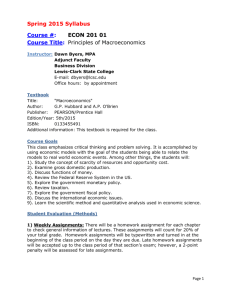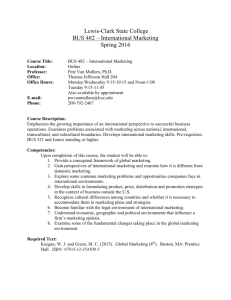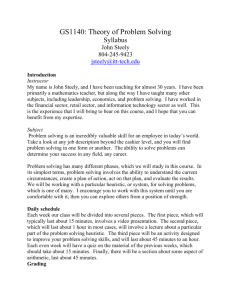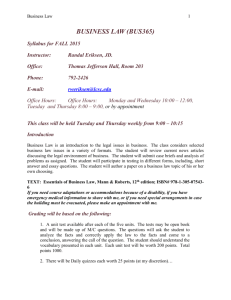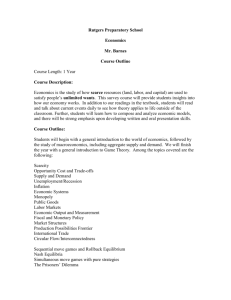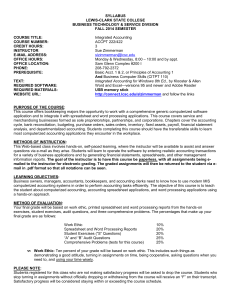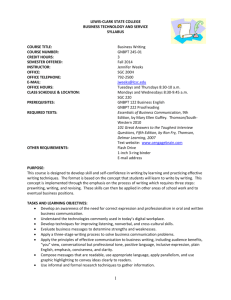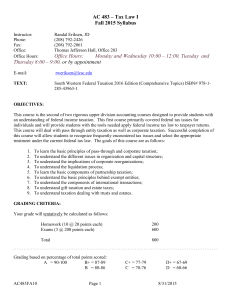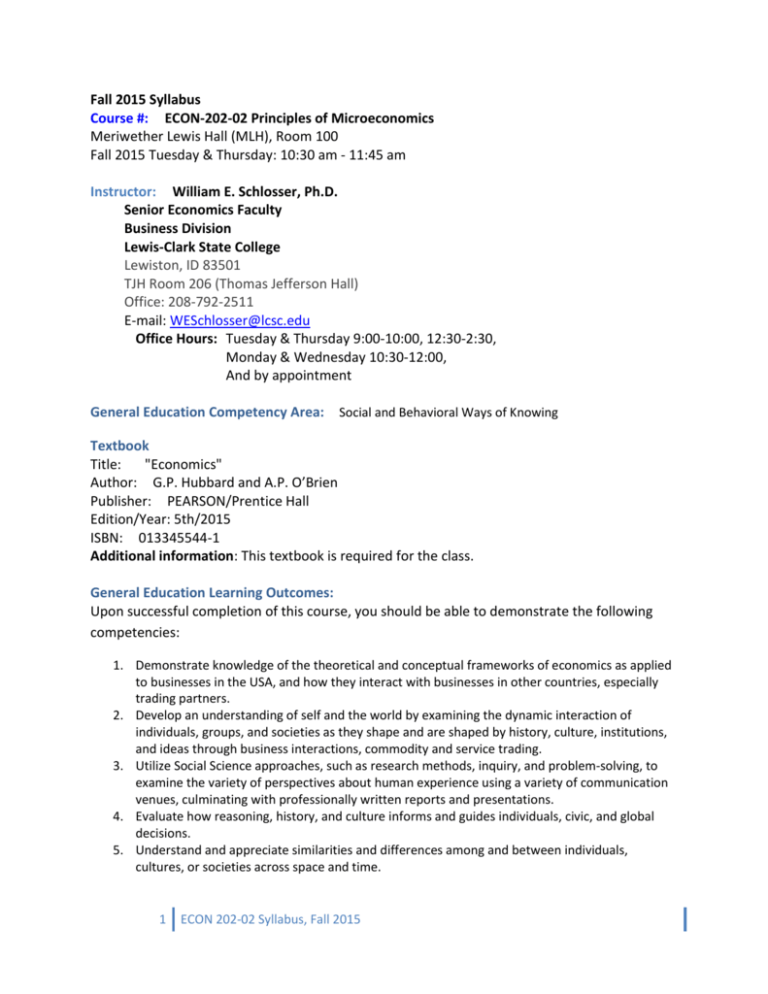
Fall 2015 Syllabus
Course #: ECON-202-02 Principles of Microeconomics
Meriwether Lewis Hall (MLH), Room 100
Fall 2015 Tuesday & Thursday: 10:30 am - 11:45 am
Instructor: William E. Schlosser, Ph.D.
Senior Economics Faculty
Business Division
Lewis-Clark State College
Lewiston, ID 83501
TJH Room 206 (Thomas Jefferson Hall)
Office: 208-792-2511
E-mail: WESchlosser@lcsc.edu
Office Hours: Tuesday & Thursday 9:00-10:00, 12:30-2:30,
Monday & Wednesday 10:30-12:00,
And by appointment
General Education Competency Area: Social and Behavioral Ways of Knowing
Textbook
Title:
"Economics"
Author: G.P. Hubbard and A.P. O’Brien
Publisher: PEARSON/Prentice Hall
Edition/Year: 5th/2015
ISBN: 013345544-1
Additional information: This textbook is required for the class.
General Education Learning Outcomes:
Upon successful completion of this course, you should be able to demonstrate the following
competencies:
1. Demonstrate knowledge of the theoretical and conceptual frameworks of economics as applied
to businesses in the USA, and how they interact with businesses in other countries, especially
trading partners.
2. Develop an understanding of self and the world by examining the dynamic interaction of
individuals, groups, and societies as they shape and are shaped by history, culture, institutions,
and ideas through business interactions, commodity and service trading.
3. Utilize Social Science approaches, such as research methods, inquiry, and problem-solving, to
examine the variety of perspectives about human experience using a variety of communication
venues, culminating with professionally written reports and presentations.
4. Evaluate how reasoning, history, and culture informs and guides individuals, civic, and global
decisions.
5. Understand and appreciate similarities and differences among and between individuals,
cultures, or societies across space and time.
1
ECON 202-02 Syllabus, Fall 2015
Course Specific Learning Outcomes:
This class emphasizes critical thinking and problem solving for Microeconomics. It is
accomplished by using economic models with the goal of the students being able to relate the
models to real world economic events. Among other things, all students will:
Explain and apply the key economic ideas: people are rational; people respond to
economic incentives; and optimal decisions are made at the margin.
Understand and be able to apply general microeconomic principles to daily activities
and current events.
Translate current economic news into the framework developed in the text
Understand various market structures and the effect of government regulations.
Understand and apply microeconomic models.
Use microeconomics to think critically about real world events.
The overall goal of this class is that you gain an understanding of microeconomics and the
ability to apply the principles and models you learn to real world events.
Tips for succeeding in this class:
Show up! I know it is a novel idea, but studies show that it works! You will also
understand the material better.
Ask questions. If you have the questions so will someone else.
Ask for help. I want you to learn and succeed in this class and I am here to help. I will
respond to emails quickly and be here before and after class if you have questions.
Take notes! If you write it down, then read it out loud 3 times, you will remember
loads more than if you just listen passively.
Read the chapters before coming to class and be prepared to discuss them.
Know that this is a class, you are here to learn, which means you may have the
wrong answer sometimes and that’s okay that’s how you learn.
Study! The quizzes are used to help you gage your level of comprehension, if you
have a hard time with a quiz it is a good indication you should study that topic more.
You get three attempts for each quiz, and history tells me that each attempt will
increase your score: there is no risk in your attempts; the highest score is promoted
to the grade book. But you need to complete your final attempt before the due date
expires.
Search for resources outside the classroom. Personally, I use the web a bunch and
mostly find it to have good resources – not always, but the good sites are there! Be
critical about what you read, and decide what “it really means”.
Student Evaluation (Methods)
1) Chapter Assignments: There will be a homework assignment for each chapter to check your
understanding of information from lectures and the textbook. These assignments will count
for 25% of your total grade. Homework assignments will be turned in through the
2
ECON 202-02 Syllabus, Fall 2015
Blackboard site on or before the due date. Late homework assignments will not be
accepted. Assignments will be graded and returned before the first class session following
the due date.
2) Chapter Quizzes: There will be a quiz at the end of each chapter to check general
comprehension of the material in the textbook and lectures. Quizzes are offered on the
course Blackboard site for each chapter; students can take three (3) on-line attempts for
each quiz, with the highest quiz score promoted to the gradebook. Quiz times are limited
and must be completed in one session. Quizzes cannot be made up, so every effort should
be made to complete the quizzes on or before the due-date. Quizzes will count for 20% of
your total grade.
3) Term Paper: One written assignment will be assigned in association with textbook materials
and in-class lectures. This is a professional paper, requiring formatting, style, citations of
references made in your writing, and clear statements of position, reasoning, and
conclusions made. This paper should be about 10-25 pages single-spaced and include at
least four references. A first draft of the term paper will be submitted after mid-term week,
with a final copy due on or before December 6, 2015. The term paper will count for 20% of
your total grade. You will be able to select a topic for the paper from materials supplied for
this phase of the course.
4) Exams: Two examinations – Midterm Exam (#1), and Final Exam (#2) will account for 35% of
your total grade. Exam #2 will be given on Thursday, Dec 15, 10:30 a.m. and last for 1 hour
50 minutes; permission to take Exam #2 prior to Finals Week will not be granted.
Grades (The letter grades for the course will based on the following overall percentage
received):
A 92-100
C
72-77
A- 90-91
C- 70-71
B+ 88-89
D+ 68-69
B 82-87
D 60-67
B- 80-81
F
59 & Below
C+ 78-79
I
See Catalog
Every effort will be made by this instructor to return graded assignments, quizzes, and exams
on the first class period following their submission.
Course Schedule
Course tasks must be coordinated with scheduled due dates for the entire class, and scheduled exams
for the class (no modification of exam dates). The intended progression of tasks for each chapter is
scheduled thus:
1. Read the Chapter (as many times as you want)
2. Attend and participate in the class lectures
3
ECON 202-02 Syllabus, Fall 2015
3. Complete and submit answers for the Chapter’s questions, turned in through the Blackboard
site.
4. Take the non-proctored chapter quiz online; up to 3 quiz attempts can be taken for each
chapter, with the highest score promoted to the grade book.
The course schedule has been designed to progress through one chapter each class session. Breaks are
arranged around mid-term and finals weeks, and scheduled holidays (Thanksgiving). The term paper
draft is due during mid-term week, and the final paper is due during the first week of December.
Class Schedule (Generally two Chapters per Week, sometimes one)
This is the schedule that we will try to stick to throughout the semester, of course there maybe
a few small deviations if necessary.
Chapter 1 – Economics: Foundations and Model
Chapter 2 – Trade-offs, Comparative Advantage, and the Market System
Chapter 3 – Where Prices Come From: The Interaction of Demand and Supply
Chapter 4 – Economic Efficiency, Government Price Setting, and Taxes
Chapter 5 – Externalities, Environmental Policy, and Public Goods
Chapter 6 – Elasticity: The Responsiveness of Supply and Demand
Chapter 7 – The Economics of Healthcare
Chapter 8 – Firms, the Stock Market, and Corporate Governance
Chapter 9 – Comparative Advantage and the Gains from International Trade
Midterm Exam – (20% of your total grade)
Chapter 10 – Consumer Choice and Behavioral Economics
Chapter 11 – Technology, Production, and Costs
Chapter 12 – Firms in Perfectly Competitive Markets
Chapter 13 – Monopolistic Competition
Chapter 14 – Oligopoly: Firms in Less Competitive Markets
Chapter 15 – Monopoly and Antitrust Policy
Chapter 16 – Pricing Strategy
Chapter 17 – The Markets for Labor and Other Factors of Production
Chapter 18 – Public Choice, Taxes, and the Distribution of Income
Third Exam – Finals Week (15% of your total grade)
4
ECON 202-02 Syllabus, Fall 2015
Planned dates for each chapter; due dates for assignments and quizzes, term paper draft and
final report, mid-term and final exam scheduled dates. Flexibility is built into the schedule with
“Catch Up” days planned to account for shifts in lectures, and for contextual discussions.
Chapter
Initiation
Introductions
Chapter 1 - Economics: Foundations and Models
Answers
Quiz
8/25/2015
8/27/2015
8/30/2015
8/30/2015
Chapter 2 – Trade-offs, Comparative Advantage, and the Market System
9/1/2015
9/6/2015
9/6/2015
Chapter 3 – Where Prices Come From: The interaction of Supply and Demand
9/3/2015
9/6/2015
9/6/2015
Chapter 4 – Economic Efficiency, Government Price Setting, and Taxes
9/8/2015
9/13/2015
9/13/2015
Chapter 5 – Externalities, Environmental Policy, and Public Goods
9/10/2015
9/13/2015
9/13/2015
Chapter 6 – Elasticity: The Responsiveness of Demand and Supply
9/15/2015
9/20/2015
9/20/2015
No Class (Division Meeting)
9/17/2015
Chapter 7 – The Economics of Healthcare
9/22/2015
9/27/2015
9/27/2015
Chapter 8 – Firms, the Stock Market, and Corporate Governance
9/29/2015
10/4/2015
10/4/2015
Chapter 9 – Comparative Advantage and the Gains from International Trade
10/1/2015
10/4/2015
10/4/2015
10/18/2015
10/18/2015
Term Paper Discussions & Review (2 Days)
10/6/2015
Midterm
Chapter 10 – Consumer Choice and Behavioral Economics
10/13/2015
Term Paper Draft
Chapter 11 – Technology, Production, and Costs
10/18/2015
10/20/2015
10/25/2015
10/25/2015
Chapter 12 – Firms in Perfectly Competitive Markets
10/22/2015
10/25/2015
10/25/2015
Chapter 13 – Monopolistic Competition
10/27/2015
11/1/2015
11/1/2015
Chapter 14 – Oligopoly: Firms in Less Competitive Markets
10/29/2015
11/1/2015
11/1/2015
11/3/2015
11/8/2015
11/8/2015
11/10/2015
11/15/2015
11/15/2015
11/12/2015
11/15/2015
11/15/2015
11/17/2015
11/20/2015
11/20/2015
Chapter 15 – Monopoly and Antitrust Policy
Chapter 16 – Pricing Strategy
Chapter 17 – The Markets for Labor and Other Factors of Production
Chapter 18 – Public Choice, Taxes, and the Distribution of Income
10/15/2015
Section 2 Review and Discussion (2 sessions)
12/1/2015
Term Paper Due
Term Paper Presentations (2 sessions)
12/5/2015
Final Exam: 10:30 am
12/8/2015
12/15/2015
Dates for the mid-term and final exam are “hard dates”. The exams must be taken on these days.
Quizzes can be taken online on or before the due dates, but not after. Late assignments are not
accepted.
5
ECON 202-02 Syllabus, Fall 2015
LEWIS-CLARK STATE COLLEGE Syllabus Addendum
Consumer Information
In 2008, the federal government required all post-secondary institutions offering federal financial aid programs to provide key data
to both prospective and current students. To comply with this requirement, Lewis-Clark State College has developed a consumer
information page, which may be accessed at http://www.lcsc.edu/consumer-information/
Disability Accommodations
Students requiring special accommodations or course adaptations due to a disability and/or a health-related issue should consult
their course instructors and the LCSC Student Counseling Center immediately (RCH 111, 792-2211). Official documentation may be
required in order to provide an accommodation and/or adaptation.
Student Rights and Responsibilities
Students have the responsibility for knowing their program requirements, course requirements, and other information associated
with their enrollment at LCSC. Students should review the LCSC General Catalog (http://webdev.lcsc.edu/catalog and the LCSC
Student Handbook (http://www.lcsc.edu/media/2157659/Student-Handbook.pdf ) for more information.
Accidents/Student Insurance
Students participating in LCSC classes normally must look to their personal health insurance policy (Student Health Insurance Plan or
comparable private coverage) should an accident occur. In the event of an accident, please seek medical help, if necessary, and
report the incident to LCSC Security (792-2226). Fieldtrips or other special student activities may also require students to submit a
signed participation waiver (forms can be obtained from the supporting Division Office).
Enrollment Verification/Attendance
Students who are not actively pursuing their classes may have to repay part or all of their financial aid awards depending upon the
circumstances.
Academic Dishonesty
Academic dishonesty, which includes cheating and plagiarism, is not tolerated at LCSC. Individual faculty members may impose their
own policies and sanctions regarding academic dishonesty after offering the student an opportunity to explain his or her actions.
Sanctions imposed by the faculty member are limited to grades on the assignment(s) in question and/or on the course grade. On
matters of academic dishonesty, faculty members do not have the authority to dismiss a student from class indefinitely nor to
disenroll a student from a program without corroboration from a Division Chair (or program ethics committee where applicable), the
appropriate instructional dean, and the Vice President for Student Affairs. Students who are accused of being academically
dishonest may be referred to the VP for Student Affairs for official disciplinary action.
Illegal File Sharing
Students using LCSC’s computers and/or computer network must comply with the college’s appropriate use policies and are
prohibited from illegally downloading or sharing data files of any kind. Specific information about the college’s technology policies
and its protocols for combating illegal file sharing may be found on the VP for Student Affairs’ web page
(http://www.lcsc.edu/student-affairs/student-code-of-conduct/ ).
Diversity Vision Statement
Regardless of race, color, age, sex, religion, national origin, disability, veteran status, or sexual orientation, you will be treated and
respected as a human being.
Disclosures
During this course, if you elect to discuss information with me which you consider to be sensitive or personal in nature and not to be
shared with others, please state this clearly. Your confidentiality in these circumstances will be respected unless upholding that
confidentiality could reasonably put you, other students, other members of the campus community, or me in danger. In those cases
or when I am bound by law to report what you have told me, such as incidents involving sexual assault or other violent acts, I will
submit a report to appropriate campus authorities.
Student Feedback
Students shall be provided the opportunity to formally evaluate each course in which they are enrolled. Notification of student
feedback opportunity and timelines will be made through the official LCSC student email (currently LCMail) or online course learning
management (currently Blackboard Learn) systems.
Student Work
Student work for this course (assignments, quizzes, exams, projects, etc.) may be copied and retained for program assessment or
accreditation purposes. For more information, speak with the instructor or division chair.
Approved by VP for Student Affairs & Provost 7/07/2015
CPC Worksheet
Component
Hours
A. Accounting (ACT)
3
B. Marketing (MKT)
0
C.
3
Finance (FIN)
D. Management
1.
Management principles (MGT)
0
2.
Organizational Behavior (OB)
0
3.
Human Resource Management (HRM)
0
4.
Operations Management (OR)
0
Total Management
E.
0
Economic/Social/Legal Environment
1.
Legal Environment of Business (LAW)
2.
Economics (ECN)
3.
Business Ethics (ETH)
Total Economic/Social/Legal Environment
F.
0
42
0
42
Decision-Support Tools
Total Decision-Support Tools
G. Global Dimensions of Business (GLOB)
H. Integrative Experience (INT)
Total Contact Hours
1.
Information Systems (IS)
2.
Quantitative Methods/Statistics (QM)
0
1.5
1.5
1.5
0
45

